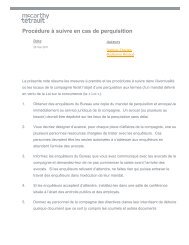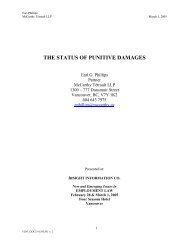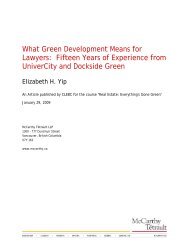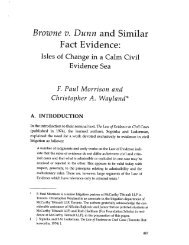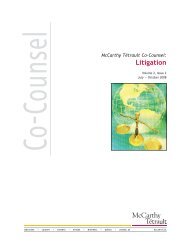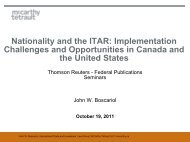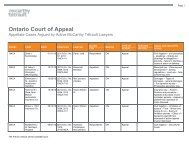The Doctrine of Public Policy in Canadian Contract Law
The Doctrine of Public Policy in Canadian Contract Law
The Doctrine of Public Policy in Canadian Contract Law
Create successful ePaper yourself
Turn your PDF publications into a flip-book with our unique Google optimized e-Paper software.
<strong>The</strong> <strong>Doctr<strong>in</strong>e</strong> <strong>of</strong> <strong>Public</strong> <strong>Policy</strong> <strong>in</strong> <strong>Canadian</strong> <strong>Contract</strong> <strong>Law</strong> 137<br />
However, as with severance, judicial approaches to the availability <strong>of</strong><br />
restitution <strong>in</strong> the case <strong>of</strong> contracts contrary to public policy would appear to be<br />
chang<strong>in</strong>g.'95 In Tri Level Claims Consultant Ltd. v. Kol<strong>in</strong>iotis,' 96 the Ontario<br />
Court <strong>of</strong> Appeal permitted the respondent paralegal bus<strong>in</strong>ess, which had provided<br />
services under a cont<strong>in</strong>gency fee agreement that was declared unenforceable<br />
on the basis <strong>of</strong> champerty, to recover the cost <strong>of</strong> those services through<br />
a quantum meruit claim. In do<strong>in</strong>g so, the Court criticized the rigour <strong>of</strong> the<br />
traditional rule which absolutely prohibited the recovery <strong>of</strong> benefits conferred<br />
under an illegal contract.197<br />
V. RETHINKING THE DOCTRINE<br />
Although there are many different theories which seek to expla<strong>in</strong> the<br />
nature <strong>of</strong> the public policy doctr<strong>in</strong>e, nearly all may be described as fall<strong>in</strong>g <strong>in</strong>to<br />
one <strong>of</strong> three ma<strong>in</strong> l<strong>in</strong>es <strong>of</strong> thought.'" <strong>The</strong> most primitive, which we shall refer<br />
to as, the positivist theory, is a response to the tw<strong>in</strong> criticisms that public policy<br />
195 This change is also reflected <strong>in</strong> the approach to restitution <strong>in</strong> the context <strong>of</strong> contracts<br />
which are <strong>in</strong>valid by reason <strong>of</strong> statutory illegality: see, e.g., Kilroy v. A OK Payday<br />
Loans Inc., 2007 BCCA 231 (C.A.) at paras. 22-23, where the Court held that the<br />
Transport factors relat<strong>in</strong>g to the spectrum approach also applied to the question <strong>of</strong><br />
whether an illegal contract could serve as a juristic reason <strong>in</strong> an unjust enrichment claim.<br />
196 (sub nom. Kol<strong>in</strong>iotis v. Tri Level Claims Consultant Ltd.) (2005), 201 O.A.C. 282, [2005]<br />
O.J. No. 3381 (C.A.) [Kol<strong>in</strong>iotis].<br />
197 Ibid. at paras. 36-39. At para. 40, the Court stated that "several factors demonstrate that<br />
an absolute bar on quantum meruit recovery creates an <strong>in</strong>justice that is unacceptable<br />
when considered <strong>in</strong> light <strong>of</strong> the public policy <strong>in</strong>form<strong>in</strong>g the statutory prohibition aga<strong>in</strong>st<br />
champertous agreements. As noted, that policy is to protect the adm<strong>in</strong>istration <strong>of</strong> justice<br />
from abuse. In the case before us, the cont<strong>in</strong>gency fee agreement was created <strong>in</strong> fair<br />
circumstances, as both parties were fully aware <strong>of</strong> what they barga<strong>in</strong>ed for. Any imbalance<br />
<strong>of</strong> power was remedied by giv<strong>in</strong>g the potentially vulnerable party time to consult<br />
with others. <strong>The</strong>re is no evidence to suggest that the respondent engaged <strong>in</strong> sharp or<br />
dishonest practice <strong>in</strong> advanc<strong>in</strong>g the appellant's claim, nor that the respondent was <strong>in</strong> a<br />
conflict <strong>of</strong> <strong>in</strong>terest with the appellant. . . [T]here is not sufficient 'moral turpitude' to<br />
justify deny<strong>in</strong>g the respondent any payment whatsoever for the work that was performed.<br />
In this regard, it is significant that it is not suggested that the respondent knew that a<br />
paralegal cont<strong>in</strong>gency fee agreement was illegal. To the contrary, it seems that cont<strong>in</strong>gency<br />
fee agreements were an accepted practice. We therefore conclude that the pr<strong>in</strong>ciple<br />
<strong>of</strong> quantum meruit can be applied <strong>in</strong> the circumstances." For a recent case <strong>in</strong> which the<br />
court denied the pla<strong>in</strong>tiff an ability to recover benefits paid under a contract contrary to<br />
public policy on the basis <strong>of</strong> factors similar to those considered <strong>in</strong> Kol<strong>in</strong>iotis (namely,<br />
that the pla<strong>in</strong>tiff <strong>in</strong>sisted on the <strong>in</strong>clusion <strong>of</strong> the objectionable term <strong>in</strong> the contract, and<br />
was not coerced <strong>in</strong>to execut<strong>in</strong>g the same via duress or unconscionable conduct), see Pay<br />
v. Kaboly-Zadeh, 2006 BCSC 925 at paras. 145 and 153.<br />
198 <strong>The</strong> reader should note that the with<strong>in</strong> discussion <strong>of</strong> the various models <strong>of</strong> public policy<br />
is at best an outl<strong>in</strong>e. Those <strong>in</strong> 'search <strong>of</strong> a more robust exegesis should consult Lloyd,<br />
supra note 11, and John Bell, <strong>Policy</strong> Arguments <strong>in</strong> Judicial Decisions (Oxford: <strong>The</strong><br />
Clarendon Press, 1983) [Bell].



